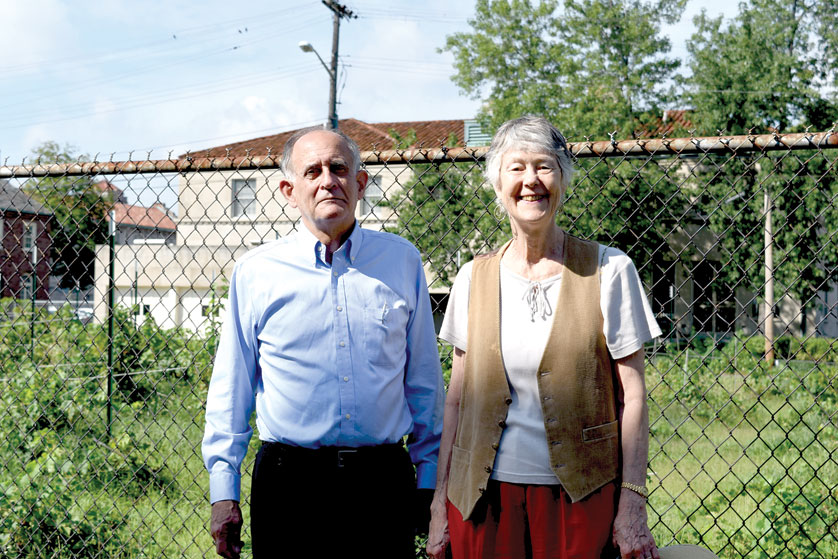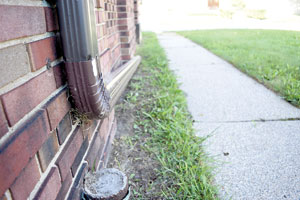Removing blacktop, planting grass helps Gesu mitigate higher drainage bills
 Detroit — Going green to save some green.
Detroit — Going green to save some green.It’s a strategy that’s been employed time and time again by businesses, churches and even individuals in an attempt to save on energy costs, reduce waste and protect the environment.
This summer, however, one Detroit parish has taken “going green” in a more literal direction in the face of higher drainage costs for many city parishes and nonprofits.
This summer, the Detroit Water and Sewerage Department announced an increase in the cost for drainage for many city properties, an attempt by the department to update its billing in relation to “impervious” land, or property where rain runoff drains into the city’s stormwater system.
The changes and accompanying bills have hit many Catholic parishes in the city especially hard as the new rates — as much as $750 per month per impervious acre — have gone into effect, causing church leaders across the city to begin seeking ways to mitigate the costs.
One parish on the city’s northwest side, however, has been ahead of the curve.
“Our parish property, which is in the city, was primarily covered in blacktop until our then-business manager, knowing what impact the impermeable surface was likely to have on our water bill, had much of the blacktop removed and the surface seeded with grass or made available for an extension to our playground,” wrote Sr. Angela Hibbard, IHM, pastoral associate at Gesu Parish in Detroit.
Sr. Hibbard’s letter emphasized a strategy parishes can use to limit their drainage bills and find ways to reduce impermeable surfaces that are taxed at the $750 per-acre monthly rate.
According to the City of Detroit, impermeable surfaces are hard surfaces such as parking lots, sidewalks, blacktop playgrounds and buildings. The general principle is that if rainwater falls onto the surface and then winds up in the city’s sewer system, that surface is taxed as an impermeable surface.
 To combat the increased water bill, Gesu took the initiative in finding ways to catch the rain water and funnel it into the ground instead of the city’s sewer system.
To combat the increased water bill, Gesu took the initiative in finding ways to catch the rain water and funnel it into the ground instead of the city’s sewer system.“We also would have been paying for the wastewater from every downspout that empties into a sewer, so as much as possible the business manager moved all the downspouts from parish buildings so that they would empty onto the earth,” Sr. Hibbard said. “That way we’re not assessed for that water.”
Bob Herman, Gesu parishioner and former parish business manager, reviewed Gesu’s grounds seven years ago, assessing how much the parish could save in water runoff charges if they made a few changes.
Before Detroit switched to the $750-per-acre system, the city charged property owners on a tier-based system, taking into account the percentage of impervious acres on a property in relation to how big the property was.
“At the time of the analysis seven years ago, there was a stair-step rate, and our property was just in the higher step rate,” Herman said. “We need to get in the lower step, so we pulled up some small patch of parking lot and planted grass. That lowered the percentage of impervious acreage we had, getting us into that lower rate.”
That lower rate was $546.65 per acre of impervious ground, but with the new, updated system, Gesu and all other parishes will have to pay $750, regardless of such ratios.
“The problem is, you can turn lights off to lower your utility usage, but for a drainage fee, you can’t,” Herman said.
Because the parish can’t control the rain, Gesu staff took to a series of improvement projects to limit how much water flowed into the sewer system, instead.
The city offers ways to reduce monthly stormwater bills posted on its website, but Sr. Hibbard said it’s incumbent on parishes to make sure the city is properly assessing all the ways parishes are funneling rainwater to lower its water bill as well as being good stewards of the earth itself.
“The key is we need to be in good communication with the city to make sure we’re be assessed properly and fairly, getting credit for all the ways we’re dealing with the runoff water,” Sr. Hibbard said. “Not all of the city records are well-kept, so we need to force a communication between the city and parishes in the city to discuss how we can lower our bill.”
In the meantime, any measure to mitigate the amount of runoff is a plus, both for the financial bottom line and for the earth.
“As we work on reductions because of these projects, we asked and remain open to working with the Water Department on water runoff mediation,” Herman said. “We want to do our part as good stewards of the earth and good neighbors in Detroit.”










